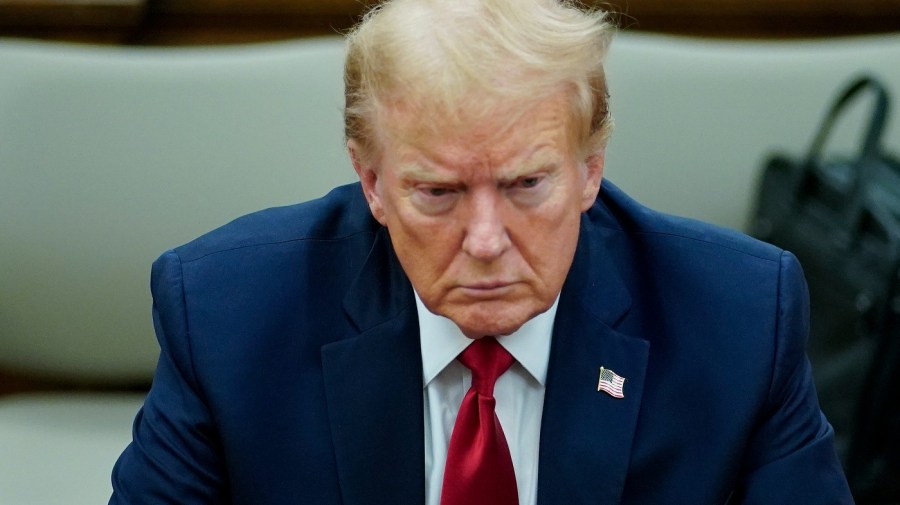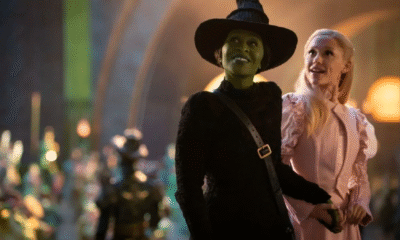Business
Trump to retake stand in New York fraud trial on December 10, 2023 at 11:00 am Business News | The Hill

Donald Trump will give the final word in his defense against claims his business engaged in a decade of fraud as the New York trial threatening his business empire nears its end.
The former president is expected to take the witness stand for a third time Monday, this time under questioning from his own legal team.
In testimony last month during the state’s case, Trump defended his business practices by downplaying key financial documents and declaring the trial corrupt. His fiery testimony often grew political, more akin to a stump speech than a direct examination as he railed against the judge and New York attorney general whom he decried as “frauds” and “political hacks.”
“It’s a disgrace that a case like this is going on; all you have to do is read the legal scholars — the papers — and you’ll know,” Trump testified in November, raising his voice. “This is a political witch hunt.”
But with Trump’s counsel steering the questioning this time, the former president will have significantly more latitude to set the narrative and espouse his side of the story.
Throughout the defense case, which began in mid-November, several witnesses reprised previous testimony while offering up their own spin.
The first time Donald Trump Jr. testified in the New York attorney general’s case, he distanced himself from documents at the heart of the case – his father’s statements of financial condition, which detail the value of the Trump Organization’s various assets and were sent to banks and insurers to secure loans and deals. New York Attorney General Letitia James’s (D) lawsuit claims the Trump Organization falsely adjusted the value of its assets to receive tax and insurance benefits.
A defendant in the case, Donald Trump Jr. said he did sign off on Trump’s financial statements while his father was president. However, he said he counted on the work of accountants and executives like then-Chief Financial Officer Allen Weisselberg to be correct.
“As a trustee, I have an obligation to listen [to] those who are expert — who have an expertise of these things,” Donald Trump Jr. testified.
But when he testified again in the defense case, the key financial statements were hardly the focus of his testimony. Instead, Donald Trump Jr. walked Judge Arthur Engoron through a glossy slideshow titled “The Trump Story” — a flashy narration of the Trump Organization’s origin story, complete with sleek photographs of the company’s luxury golf courses and hotels. Notably glossed over were the valuations of those properties.
Jeff McConney, the Trump Organization’s ex-corporate controller and another defendant in the case, had similarly variant testimonies when called as a state versus defense witness.
McConney’s testimony was used as a vehicle for state lawyers to show evidence that Trump’s statements of financial condition were integral to some loan deals. He also said he believed Trump reviewed those documents before they were finalized, linking Trump to the skewed documents.
But McConney’s testimony for the defense focused far less on logistics. Nearly in tears, he testified to the exhaustion caused by the Trump Organization’s barrage of legal issues, which ultimately led the 36-year veteran of the company to retire in February.
“I’m very proud of the work that I did,” McConney said before detailing all the investigations and legal proceedings he’s been pulled into.
“I just wanted to relax and stop being accused of misrepresenting assets for the company that I loved working for,” he said.
When Trump retakes the stand, arguments he attempted to make while testifying for the state could be bolstered and reframed after other defense witness testimony backed him up.
Several Deutsche Bank executives, for example, affirmed defense arguments including that the bank wanted to work with the Trump Organization, did its own due diligence and found no fraud. Trump made those points in his own testimony.
“Banks check the work,” Trump testified, arguing that his statements of financial condition weren’t just taken at face value by the bankers with which Trump Organization executives worked.
Deutsche Bank Managing Director David Williams’s testified last month for the defense that bankers viewed their clients’ statements of financial condition as “subjective or subject to estimates” — and, that the bank took its own look at reports of net worth.
“I think we expect clients’ provided information to be accurate,” Williams said. “At the same time, it’s not an industry standard that these statements be audited.”
“They’re largely reliant on the use of estimates,” he added, so bankers routinely “make some adjustments.”
It’s all-but inevitable that Trump’s inflammatory political rhetoric will surface again, as well.
In the month since he testified, Trump and his counsel have been locked in a battle with the trial judge, whom they claim has been biased against them from the start. The dispute began after Engoron imposed a gag order on Trump and his lawyers barring them from publicly discussing the judge’s staff.
The order doesn’t prevent Trump’s team from criticizing the judge himself or James, the state’s top prosecutor. Nonetheless, that contention has placed Engoron directly in Trump’s line of fire on social media and in person. During his testimony last month, Trump lambasted the judge as “Trump hating” and questioned his impartiality.
The former president’s legal team attempted to delay his testimony until after their appeal of the gag order plays out, but the judge forcefully denied that effort.
“He is not capable of fully testifying because he is subject to the gag order,” Trump attorney Chris Kise argued, according to ABC News.
“Absolutely not. No way. No how. It’s a nonstarter,” Engoron said.
Trump’s third round of testimony – following a judge-ordered stint on the witness stand over a violation of the gag order and his examination by the state – could also give insight into how he’ll behave as his criminal trials get underway in the new year.
The former president faces a combined 91 charges across four criminal cases, the first of which is expected to head to trial in Washington on March 4.
The Associated Press contributed.
Business, Court Battles, News, New York, Trump civil fraud trial, Trump Organization Donald Trump will give the final word in his defense against claims his business engaged in a decade of fraud as the New York trial threatening his business empire nears its end. The former president is expected to take the witness stand for a third time Monday, this time under questioning from his own legal…
Business
Google Accused Of Favoring White, Asian Staff As It Reaches $28 Million Deal That Excludes Black Workers

Google has tentatively agreed to a $28 million settlement in a California class‑action lawsuit alleging that white and Asian employees were routinely paid more and placed on faster career tracks than colleagues from other racial and ethnic backgrounds.
- A Santa Clara County Superior Court judge has granted preliminary approval, calling the deal “fair” and noting that it could cover more than 6,600 current and former Google workers employed in the state between 2018 and 2024.

How The Discrimination Claims Emerged
The lawsuit was brought by former Google employee Ana Cantu, who identifies as Mexican and racially Indigenous and worked in people operations and cloud departments for about seven years. Cantu alleges that despite strong performance, she remained stuck at the same level while white and Asian colleagues doing similar work received higher pay, higher “levels,” and more frequent promotions.
Cantu’s complaint claims that Latino, Indigenous, Native American, Native Hawaiian, Pacific Islander, and Alaska Native employees were systematically underpaid compared with white and Asian coworkers performing substantially similar roles. The suit also says employees who raised concerns about pay and leveling saw raises and promotions withheld, reinforcing what plaintiffs describe as a two‑tiered system inside the company.
Why Black Employees Were Left Out
Cantu’s legal team ultimately agreed to narrow the class to employees whose race and ethnicity were “most closely aligned” with hers, a condition that cleared the path to the current settlement.

The judge noted that Black employees were explicitly excluded from the settlement class after negotiations, meaning they will not share in the $28 million payout even though they were named in earlier versions of the case. Separate litigation on behalf of Black Google employees alleging racial bias in pay and promotions remains pending, leaving their claims to be resolved in a different forum.
What The Settlement Provides
Of the $28 million total, about $20.4 million is expected to be distributed to eligible class members after legal fees and penalties are deducted. Eligible workers include those in California who self‑identified as Hispanic, Latinx, Indigenous, Native American, American Indian, Native Hawaiian, Pacific Islander, and/or Alaska Native during the covered period.
Beyond cash payments, Google has also agreed to take steps aimed at addressing the alleged disparities, including reviewing pay and leveling practices for racial and ethnic gaps. The settlement still needs final court approval at a hearing scheduled for later this year, and affected employees will have a chance to opt out or object before any money is distributed.
H2: Google’s Response And The Broader Stakes
A Google spokesperson has said the company disputes the allegations but chose to settle in order to move forward, while reiterating its public commitment to fair pay, hiring, and advancement for all employees. The company has emphasized ongoing internal audits and equity initiatives, though plaintiffs argue those efforts did not prevent or correct the disparities outlined in the lawsuit.
For many observers, the exclusion of Black workers from the settlement highlights the legal and strategic complexities of class‑action discrimination cases, especially in large, diverse workplaces. The outcome of the remaining lawsuit brought on behalf of Black employees, alongside this $28 million deal, will help define how one of the world’s most powerful tech companies is held accountable for alleged racial inequities in pay and promotion.
Business
Luana Lopes Lara: How a 29‑Year‑Old Became the Youngest Self‑Made Woman Billionaire

At just 29, Luana Lopes Lara has taken a title that usually belongs to pop stars and consumer‑app founders.
Multiple business outlets now recognize her as the world’s youngest self‑made woman billionaire, after her company Kalshi hit an 11 billion dollar valuation in a new funding round.
That round, a 1 billion dollar Series E led by Paradigm with Sequoia Capital, Andreessen Horowitz, CapitalG and others participating, instantly pushed both co‑founders into the three‑comma club. Estimates place Luana’s personal stake at roughly 12 percent of Kalshi, valuing her net worth at about 1.3 billion dollars—wealth tied directly to equity she helped create rather than inheritance.

Kalshi itself is a big part of why her ascent matters.
Founded in 2019, the New York–based company runs a federally regulated prediction‑market exchange where users trade yes‑or‑no contracts on real‑world events, from inflation reports to elections and sports outcomes.
As of late 2025, the platform has reached around 50 billion dollars in annualized trading volume, a thousand‑fold jump from roughly 300 million the year before, according to figures cited in TechCrunch and other financial press. That hyper‑growth convinced investors that event contracts are more than a niche curiosity, and it is this conviction—expressed in billions of dollars of new capital—that turned Luana’s share of Kalshi into a billion‑dollar fortune almost overnight.
Her path to that point is unusually demanding even by founder standards. Luana grew up in Brazil and trained at the Bolshoi Theater School’s Brazilian campus, where reports say she spent up to 13 hours a day in class and rehearsal, competing for places in a program that accepts fewer than 3 percent of applicants. After a stint dancing professionally in Austria, she pivoted into academics, enrolling at the Massachusetts Institute of Technology to study computer science and mathematics and later completing a master’s in engineering.
During summers she interned at major firms including Bridgewater Associates and Citadel, gaining a front‑row view of how global macro traders constantly bet on future events—but without a simple, regulated way for ordinary people to do the same.

That realization shaped Kalshi’s founding thesis and ultimately her billionaire status. Together with co‑founder Tarek Mansour, whom she met at MIT, Luana spent years persuading lawyers and U.S. regulators that a fully legal event‑trading exchange could exist under commodities law. Reports say more than 60 law firms turned them down before one agreed to help, and the company then spent roughly three years in licensing discussions with the Commodity Futures Trading Commission before gaining approval. The payoff is visible in 2025’s numbers: an 11‑billion‑dollar valuation, a 1‑billion‑dollar fresh capital injection, and a founder’s stake that makes Luana Lopes Lara not just a compelling story but a data point in how fast wealth can now be created at the intersection of finance, regulation, and software.
Business
Harvard Grads Jobless? How AI & Ghost Jobs Broke Hiring

America’s job market is facing an unprecedented crisis—and nowhere is this more painfully obvious than at Harvard, the world’s gold standard for elite education. A stunning 25% of Harvard’s MBA class of 2025 remains unemployed months after graduation, the highest rate recorded in university history. The Ivy League dream has become a harsh wakeup call, and it’s sending shockwaves across the professional landscape.

Jobless at the Top: Why Graduates Can’t Find Work
For decades, a Harvard diploma was considered a golden ticket. Now, graduates send out hundreds of résumés, often from their parents’ homes, only to get ghosted or auto-rejected by machines. Only 30% of all 2025 graduates nationally have found full-time work in their field, and nearly half feel unprepared for the workforce. “Go to college, get a good job“—that promise is slipping away, even for the smartest and most driven.
Tech’s Iron Grip: ATS and AI Gatekeepers
Applicant tracking systems (ATS) and AI algorithms have become ruthless gatekeepers. If a résumé doesn’t perfectly match the keywords or formatting demanded by the bots, it never reaches human eyes. The age of human connection is gone—now, you’re just a data point to be sorted and discarded.
AI screening has gone beyond basic qualifications. New tools “read” for inferred personality and tone, rejecting candidates for reasons they never see. Worse, up to half of online job listings may be fake—created simply to collect résumés, pad company metrics, or fulfill compliance without ever intending to fill the role.
The Experience Trap: Entry-Level Jobs Require Years
It’s not just Harvard grads who are hurting. Entry-level roles demand years of experience, unpaid internships, and portfolios that resemble a seasoned professional, not a fresh graduate. A bachelor’s degree, once the key to entry, is now just the price of admission. Overqualified candidates compete for underpaid jobs, often just to survive.
One Harvard MBA described applying to 1,000 jobs with no results. Companies, inundated by applications, are now so selective that only those who precisely “game the system” have a shot. This has fundamentally flipped the hiring pyramid: enormous demand for experience, shrinking chances for new entrants, and a brutal gauntlet for anyone not perfectly groomed by internships and coaching.
Burnout Before Day One
The cost is more than financial—mental health and optimism are collapsing among the newest generation of workers. Many come out of elite programs and immediately end up in jobs that don’t require degrees, or take positions far below their qualifications just to pay the bills. There’s a sense of burnout before careers even begin, trapping talent in a cycle of exhaustion, frustration, and disillusionment.
Cultural Collapse: From Relationships to Algorithms
What’s really broken? The culture of hiring itself. Companies have traded trust, mentorship, and relationships for metrics, optimizations, and cost-cutting. Managers no longer hire on potential—they rely on machines, rankings, and personality tests that filter out individuality and reward those who play the algorithmic game best.
AI has automated the very entry-level work that used to build careers—research, drafting, and analysis—and erased the first rung of the professional ladder for thousands of new graduates. The result is a workforce filled with people who know how to pass tests, not necessarily solve problems or drive innovation.
The Ghost Job Phenomenon
Up to half of all listings for entry-level jobs may be “ghost jobs”—positions posted online for optics, compliance, or future needs, but never intended for real hiring. This means millions of job seekers spend hours on applications destined for digital purgatory, further fueling exhaustion and cynicism.
Not Lazy—Just Locked Out
Despite the headlines, the new class of unemployed graduates is not lazy or entitled—they are overqualified, underleveraged, and battered by a broken process. Harvard’s brand means less to AI and ATS systems than the right keyword or résumé format. Human judgment has been sidelined; individuality is filtered out.

What’s Next? Back to Human Connection
Unless companies rediscover the value of human potential, mentorship, and relationships, the job search will remain a brutal numbers game—one that even the “best and brightest” struggle to win. The current system doesn’t just hurt workers—it holds companies back from hiring bold, creative talent who don’t fit perfect digital boxes.
Key Facts:
- 25% of Harvard MBAs unemployed, highest on record
- Only 30% of 2025 grads nationwide have jobs in their field
- Nearly half of grads feel unprepared for real work
- Up to 50% of entry-level listings are “ghost jobs”
- AI and ATS have replaced human judgment at most companies
If you’ve felt this struggle—or see it happening around you—share your story in the comments. And make sure to subscribe for more deep dives on the reality of today’s economy and job market.
This is not just a Harvard problem. It’s a sign that America’s job engine is running on empty, and it’s time to reboot—before another generation is locked out.

 Entertainment4 weeks ago
Entertainment4 weeks agoWicked Sequel Disappoints Fans: Audience Verdict on For Good

 Entertainment4 weeks ago
Entertainment4 weeks agoAriana & Cynthia Say They’re in a ‘Non‑Demi Curious, Semi‑Binary’ Relationship… WTF Does That Even Mean?

 News4 weeks ago
News4 weeks agoMexico Bans Dophin Shows Nationwide

 Entertainment4 weeks ago
Entertainment4 weeks agoColombia’s ‘Doll’ Arrest: Police Say a 23-Year-Old Orchestrated Hits, Including Her Ex’s Murder

 Entertainment4 weeks ago
Entertainment4 weeks agoHow The Grinch Became The Richest Christmas Movie Ever

 Entertainment4 weeks ago
Entertainment4 weeks agoMiley Cyrus Is Engaged to Maxx Morando

 Business3 weeks ago
Business3 weeks agoLuana Lopes Lara: How a 29‑Year‑Old Became the Youngest Self‑Made Woman Billionaire

 News4 weeks ago
News4 weeks agoUS May Completely Cut Income Tax Due to Tariff Revenue






























